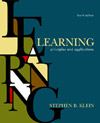 |
1 |  | 
Research has shown that learning a list of words underwater results in better recall underwater than on dry land. |
|  | A) | TRUE |
|  | B) | FALSE |
 |
 |
2 |  | 
Marijuana does not show state-dependent learning when cued-recall tests are used. |
|  | A) | TRUE |
|  | B) | FALSE |
 |
 |
3 |  | 
Decay is probably a more important source of forgetting than interference. |
|  | A) | TRUE |
|  | B) | FALSE |
 |
 |
4 |  | 
In terms of interference, research supports Melton and Irwin's two-factor view. |
|  | A) | TRUE |
|  | B) | FALSE |
 |
 |
5 |  | 
According to Bartlett, we reconstruct memories based on inferences of what "must have happened." |
|  | A) | TRUE |
|  | B) | FALSE |
 |
 |
6 |  | 
In general, eyewitness testimony shows considerable accuracy. |
|  | A) | TRUE |
|  | B) | FALSE |
 |
 |
7 |  | 
Although memories tend to be somewhat inaccurate, it is the detail that is lost rather than the gist of the events. |
|  | A) | TRUE |
|  | B) | FALSE |
 |
 |
8 |  | 
It appears relatively easy to create a false memory in someone. |
|  | A) | TRUE |
|  | B) | FALSE |
 |
 |
9 |  | 
There is no convincing evidence that people can repress disturbing information for years and then remember it accurately. |
|  | A) | TRUE |
|  | B) | FALSE |
 |
 |
10 |  | 
From Underwood's perspective, the presence of memory attributes is necessary for retrieval of stored information. |
|  | A) | TRUE |
|  | B) | FALSE |
 |
 |
11 |  | 
All forgetting may be attributed to retrieval failure. |
|  | A) | TRUE |
|  | B) | FALSE |
 |
 |
12 |  | 
Although an attribute may not be represented as part of a memory, it is still necessary for retrieval of that memory. |
|  | A) | TRUE |
|  | B) | FALSE |
 |
 |
13 |  | 
According to Zaragoza, McCloskey, and Jamis (1987), misled subjects actually possess two memories, the original and the reconstructed one. |
|  | A) | TRUE |
|  | B) | FALSE |
 |
 |
14 |  | 
Ebbinghaus found that relearning a set of nonsense syllables took longer than the original learning, a phenomenon he called savings. |
|  | A) | TRUE |
|  | B) | FALSE |
 |
 |
15 |  | 
Ebbinghaus found that even 6 days after learning, he retained approximately 75 percent of the words he had learned. |
|  | A) | TRUE |
|  | B) | FALSE |
 |



 2002 McGraw-Hill Higher Education
2002 McGraw-Hill Higher Education